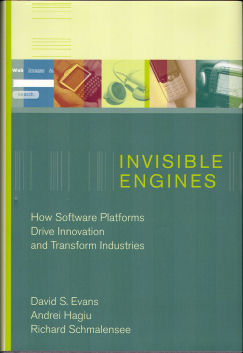
|
FreeComputerBooks.com
Links to Free Computer, Mathematics, Technical Books all over the World
|
|
- Title Invisible Engines: How Software Platforms Drive Innovation and Transform Industries
- Authors David S. Evans, Andrei Hagiu and Richard Schmalensee
- Publisher: The MIT Press; (April, 2008)
- License: Attribution-Noncommercial-Share Alike 3.0
- Paperback: 408 pages
- eBook PDF (408 pages, 4.0 MB), ePub, and Kindle, etc.
- Language: English
- ISBN-10: 0262550687
- ISBN-13: 978-0262550680
- Share This:

|
Software platforms are the invisible engines that have created, touched, or transformed nearly every major industry for the past quarter century. They power everything from mobile phones and automobile navigation systems to search engines and web portals. They have been the source of enormous value to consumers and helped some entrepreneurs build great fortunes. And they are likely to drive change that will dwarf the business and technology revolution we have seen to this point. Invisible Engines examines the business dynamics and strategies used by firms that recognize the transformative power unleashed by this new revolution - a revolution that will change both new and old industries.
The authors argue that in order to understand the successes of software platforms, we must first understand their role as a technological meeting ground where application developers and end users converge. Apple, Microsoft, and Google, for example, charge developers little or nothing for using their platforms and make most of their money from end users; Sony PlayStation and other game consoles, by contrast, subsidize users and make more money from developers, who pay royalties for access to the code they need to write games. More applications attract more users, and more users attract more applications. And more applications and more users lead to more profits.
Invisible Engines explores this story through the lens of the companies that have mastered this platform-balancing act. It offers detailed studies of the personal computer, video game console, personal digital assistant, smart mobile phone, and digital media software platform industries, focusing on the business decisions made by industry players to drive profits and stay a step ahead of the competition. Shorter discussions of Internet-based software platforms provide an important glimpse into a future in which the way we buy, pay, watch, listen, learn, and communicate will change forever.
About the Authors- David S. Evans is Managing Director of the Global Competition Policy Practice at LECG LLC.
- Andrei Hagiu is Assistant Professor of Strategy at Harvard Business School.
- Richard L. Schmalensee is John C. Head III Dean and Professor of Management and Economics at the MIT Sloan School of Management. He is co-editor of Management: Inventing and Delivering Its Future (MIT Press, 2003).

- Invisible Engines: How Software Platforms Drive Innovation and Transform Industries
- The Mirror Site (1) - PDF
- The Mirror Site (2) - PDF Files
-
 Software Innovation: Heuristics for Creative System Developers
Software Innovation: Heuristics for Creative System Developers
This book sets out the new field of software innovation. It organizes the existing scientific research into eight simple heuristics - guiding principles for organizing a system developer's work-life so that it focuses on innovation.
-
 Software and Mind: The Mechanistic Myth and Its Consequences
Software and Mind: The Mechanistic Myth and Its Consequences
Addressing general readers as well as software practitioners, this book discusses the fallacies of the mechanistic ideology and the degradation of minds caused by these fallacies. The software elites are promoting invalid, even fraudulent, software notions.
-
 Rethinking Productivity in Software Engineering (C. Sadowski, ...)
Rethinking Productivity in Software Engineering (C. Sadowski, ...)
This book covers definitions and core concepts related to productivity, guidelines for measuring productivity in specific contexts, best practices and pitfalls, and theories and open questions on productivity.
-
 Low-Code For Dummies (Jason Bloomberg, et al.)
Low-Code For Dummies (Jason Bloomberg, et al.)
Low-code application development describes creating application software using visual tools and model-driven processes - instead of traditional code-based programming. It's something for professional developers, as well as people in any business role.
-
 The Future of Software Quality Assurance (Stephan Goericke)
The Future of Software Quality Assurance (Stephan Goericke)
This open access book Highlights the state of the art in software testing, as well as future challenges and trends, covers current and emerging technologies like test automation, DevOps, and artificial intelligence methodologies used for software testing.
-
 Building Secure and Reliable Systems: Best Practices
Building Secure and Reliable Systems: Best Practices
Security is crucial to the design and operation of scalable systems in production. Experts from Google share best practices to help your organization design scalable and reliable systems that are fundamentally secure.
-
 Handbook of Software Engineering Methods (Lara Letaw)
Handbook of Software Engineering Methods (Lara Letaw)
This book demystifies the software engineering methodologies and techniques that professional developers use to design and build robust, efficient, and consistently reliable software.
-
 The Essence of Software Engineering (Volker Gruhn, et al)
The Essence of Software Engineering (Volker Gruhn, et al)
This book offers readers a concise overview of the essence of software engineering, providing valuable insights into the latest methodological research findings and adesso's experience applying these results in real-world projects.





